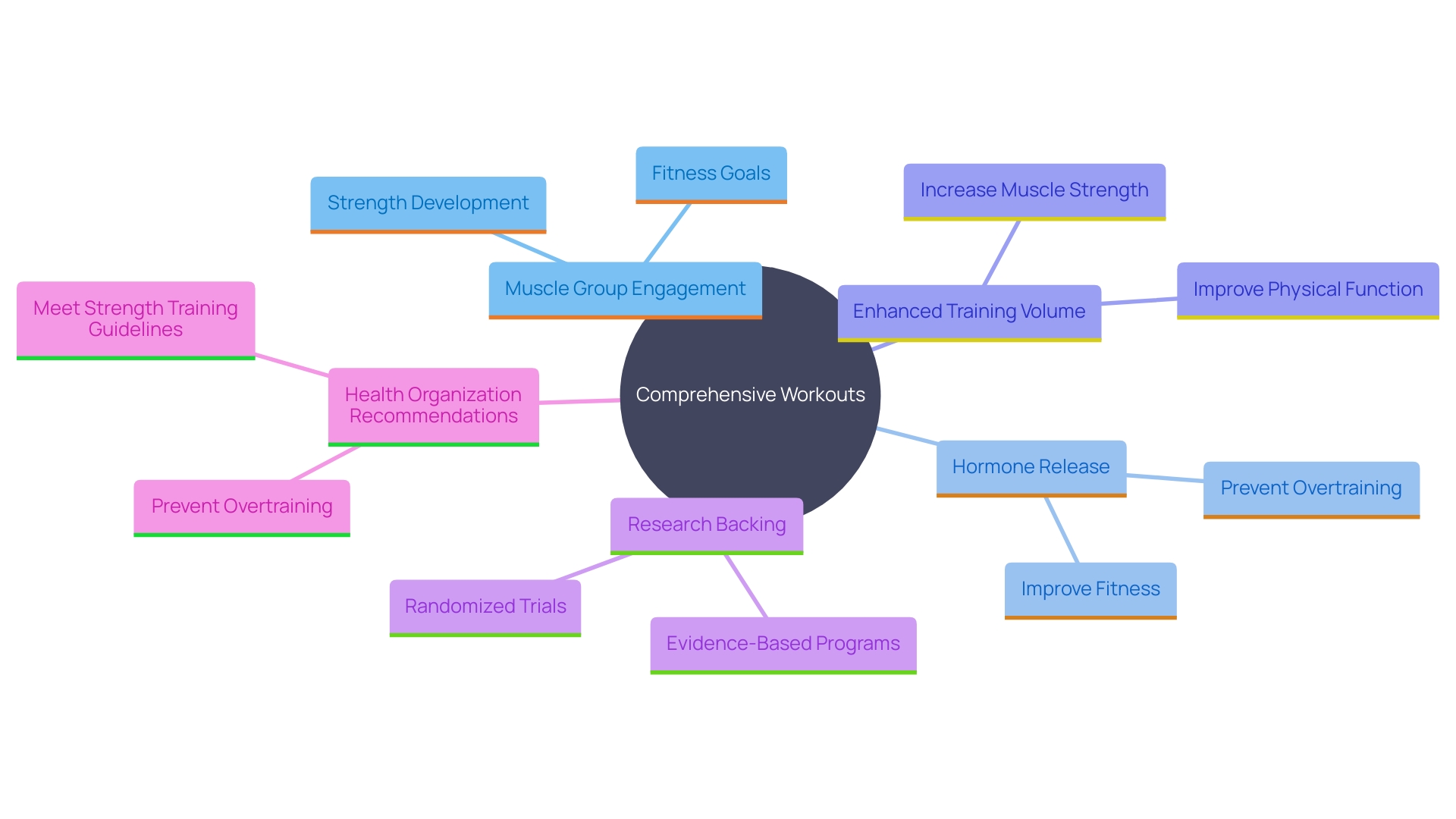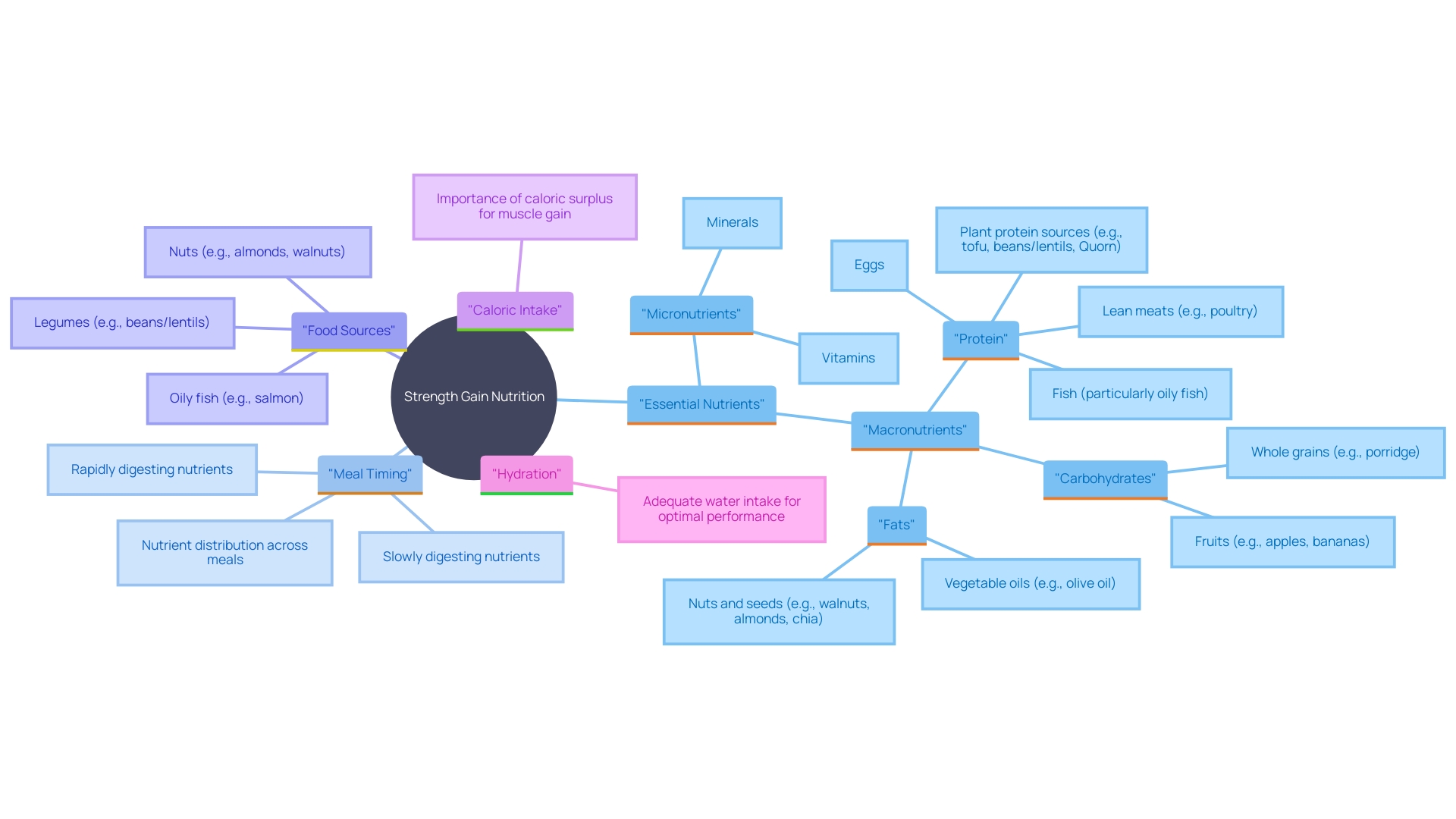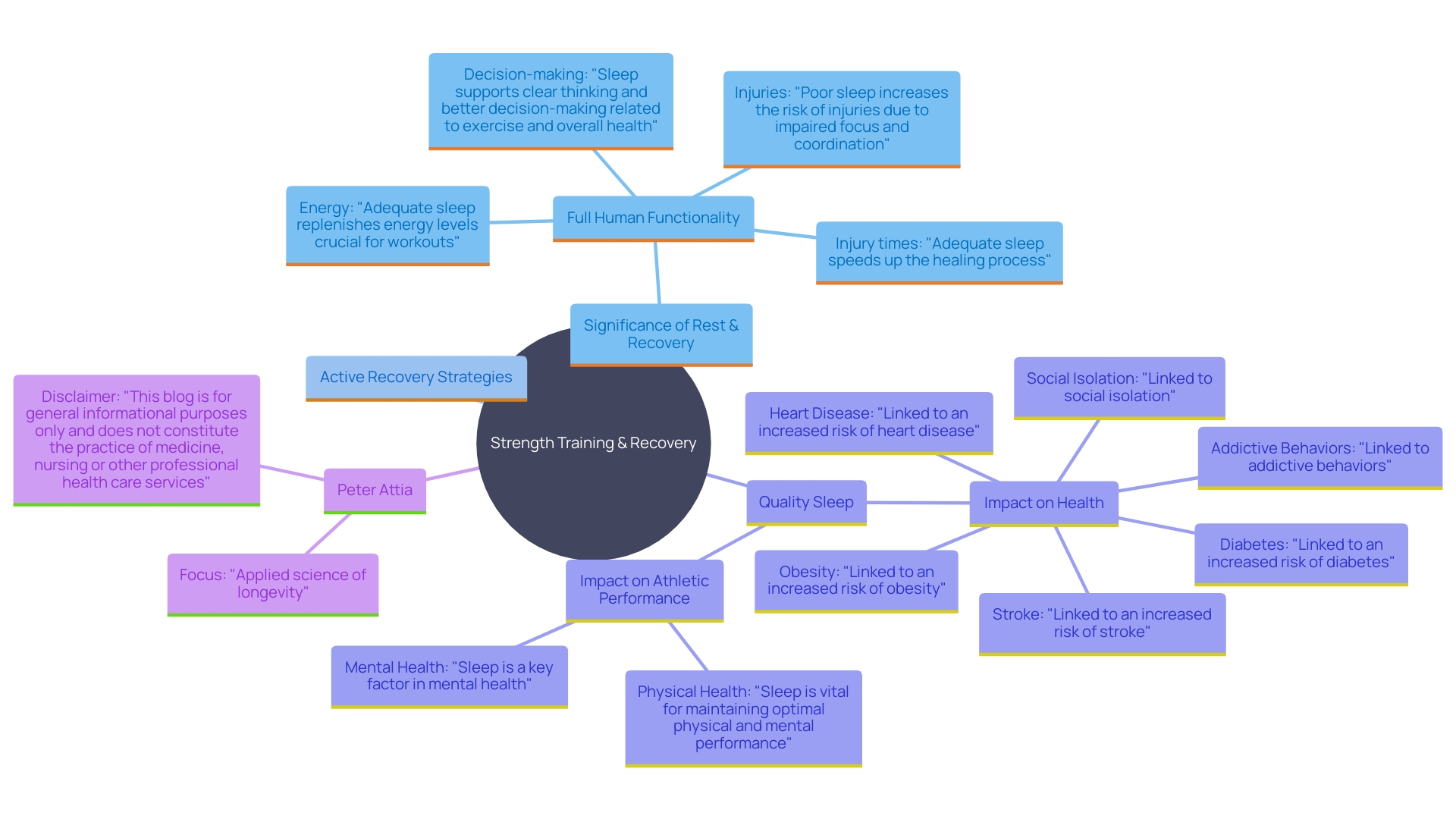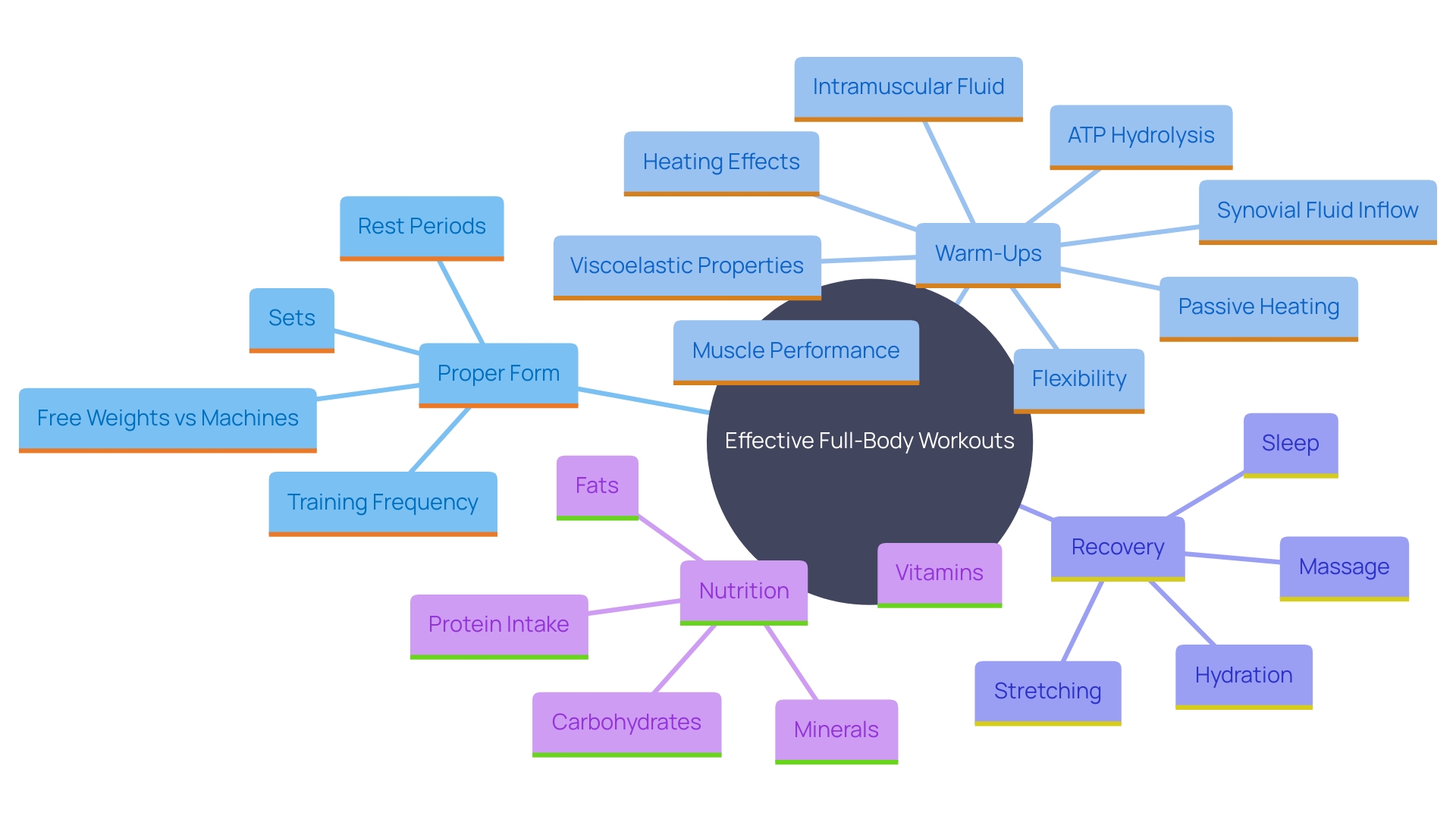Introduction
Achieving muscle gain requires a strategic approach that encompasses various facets of fitness and wellness. Full body workouts stand out as a superior method to build muscle because they engage multiple muscle groups simultaneously, promoting a balanced physique and robust strength. This comprehensive guide will explore the myriad benefits of full body workouts, delve into the importance of compound exercises, and outline the optimal structure for these routines.
Additionally, insights into nutritional considerations and recovery strategies will be provided to ensure that every element of muscle-building is addressed. Avoiding common mistakes will further enhance the effectiveness of your workouts. Embracing full body workouts can transform your fitness journey, leading to significant muscle gains and overall improved health.
Benefits of Full Body Workouts for Muscle Gain
Comprehensive workouts are extremely beneficial for strength development as they involve various groups of muscles during every session. This approach promotes a balanced physique and enhances overall strength. By exercising the whole physique, you encourage a larger release of hormones such as testosterone and growth hormone, which are essential for development of strength. Furthermore, complete routines can be carried out more often, enabling enhanced training volume over time, resulting in greater tissue growth. The significance of complete body exercises is additionally backed by research, including a study carried out by Edith Cowan University and Niigata University of Health and Welfare, which discovered that even slight weight lifting can greatly improve strength. This discovery questions traditional views on the requirement of rigorous exercise regimens for strength development. Furthermore, the American Diabetes Association recommends resistance training for all major body groups, highlighting its benefits for managing glucose metabolism and improving insulin sensitivity. 'Adopting comprehensive exercise routines can be transformative, offering a reliable and efficient route to developing strength and reaching fitness objectives.'.

Choosing Compound Exercises for Full Body Workouts
When designing a full-body workout, it is crucial to focus on compound exercises that involve multiple joints and groups of fibers simultaneously. Exercises like squats, deadlifts, bench presses, and pull-ups not only enhance engagement of the body but also considerably boost functional strength. According to the American College of Sports Medicine, physical aptitude is closely related to components like strength and flexibility, crucial for health maintenance and functional autonomy.
Incorporating these exercises ensures efficient strength building while enhancing coordination and stability. A balanced mix of upper and lower body compound movements creates a well-rounded workout, promoting physical function, metabolic health, and healthy aging. Resistance training remains the most effective method to improve strength and size, as indicated by numerous studies and research.
Furthermore, a groundbreaking study by Edith Cowan University revealed that even minimalistic exercise routines, such as lifting weights for three seconds a day, can significantly enhance strength. This discovery questions the conventional notion that extensive exercise regimens are essential, providing new perspectives on fitness and strength training methods.
Structuring a Full Body Workout Routine
To design an effective full body workout, it's crucial to include a warm-up that prepares your body and enhances flexibility. Research has demonstrated that a proper warm-up enhances contractile properties and improves tissue visco-elasticity, which can significantly boost performance and reduce injury risk.
After the warm-up, participate in a combination of compound exercises that focus on different groups of muscles. A comprehensive routine might include 3-4 compound exercises such as squats, deadlifts, and bench presses, performed in 3-4 sets of 6-12 repetitions each. These exercises are recognized to effectively enhance strength and size, contributing to overall physical function and metabolic health.
Include exercises that work the legs, back, chest, shoulders, and arms to ensure balanced strength development. This approach not only maximizes stimulation of the tissues but also adheres to the guidelines for effective resistance training, which is considered the most impactful method for growth.
Conclude your exercise routine with a cool-down session and flexibility exercises. Cooling down aids in gradual recovery, lessens stiffness, and encourages long-term flexibility. By incorporating these elements, you create a balanced exercise regimen that enhances physical development while reducing the risk of injury.
Nutritional Considerations for Muscle Gain
Nutrition is a cornerstone of strength gain, working hand-in-hand with your workout regimen to achieve optimal results. Focus on a diet rich in essential nutrients, a vital element for tissue repair and development. Aim for a daily consumption of 1.6 to 2.2 grams of nutrients per kilogram of mass. Research indicates that consuming 20-30 grams of nutrients per meal can maximize muscle synthesis (MPS) in the 2-3 hours following ingestion. However, recent studies suggest that the body may continue to respond to higher nutrient intakes, adding nuance to traditional guidelines.
Distribute your nutrient consumption across 3-5 meals to sustain elevated MPS throughout the day. Incorporate both rapidly-digesting nutrients, like whey, after exercise to enhance recovery, and slowly-digesting nutrients, such as casein, prior to sleep to support overnight tissue repair.
Along with essential nutrients, balance your diet with carbohydrates for energy and healthy fats for overall well-being. Consuming enough calories is vital, as inadequate caloric intake can hinder your muscle-building efforts. Nutrient timing is also essential; combining amino acids and carbs after exercise can improve recovery and muscle development.
Eggs, high in leucine, and nuts, which provide a balanced combination of nutrients, fats, and fiber, are outstanding options. For those on a plant-based diet, soybeans provide a robust protein source. Proper hydration and mindful eating will further support your muscle-building journey, helping you achieve your fitness goals.

Recovery and Rest in Full Body Workouts
Rest is equally important as the exercise itself for strength growth. Arranging comprehensive exercise sessions 2-3 times a week with recovery days in between enables the body to recover and develop effectively. Active recovery strategies, such as light cardio and stretching on off days, can enhance this process. Focusing on rest is crucial, as it greatly affects recovery and performance. Quality sleep supports injury prevention, accelerates healing, and improves decision-making. Ensuring adequate rest helps prevent overtraining and supports sustainable progress. According to Dr. Amy Rantala, "Sleep filters out and deletes some information while storing other information in memory," highlighting its role in overall health and athletic performance.

Common Mistakes to Avoid in Full Body Workouts
Enhancing the effectiveness of your full-body workouts requires attention to several key factors. First and foremost, proper form is crucial. Neglecting technique in favor of lifting heavier weights can lead to injuries, hampering your progress and sidelining your training. 'In a study by the University of Murcia, both free weights and weight machines were found to be equally effective in building strength and bulk, underscoring the importance of correct form over the type of equipment used.'.
Skipping warm-ups is another common mistake. Warm-ups ready your body for the intense activity ahead, reducing the risk of strains and enhancing your overall performance. According to a systematic review published in the British Journal of Sports Medicine, incorporating isometric exercises like planks and wall sits can be particularly effective in enhancing strength and preparing your body.
Overtraining is a pitfall that can hinder your progress. Permitting adequate recovery time is crucial for growth of tissues. A study involving 50 resistance-trained individuals demonstrated that a structured training program with adequate recovery periods led to significant strength increases. This highlights the importance of balancing training intensity with rest.
Lastly, nutrition plays a vital role in gaining strength. Fueling your body with a balanced diet rich in proteins, carbohydrates, and healthy fats ensures that you have the energy needed for intense workouts and the nutrients required for repair and growth. Progressive overload, which involves gradually increasing the stress placed on your tissues, is fundamental to growth. This principle, combined with appropriate recovery and nutrition, creates the trifecta for successful strength development.
By avoiding these common pitfalls and focusing on proper form, warm-ups, adequate recovery, and balanced nutrition, you can maximize the effectiveness of your full-body workouts and achieve your muscle gain goals.

Conclusion
Full body workouts offer a comprehensive approach to muscle gain, engaging multiple muscle groups and promoting a balanced physique. The significant hormonal response triggered by these routines not only enhances muscle development but also allows for increased training frequency, leading to greater hypertrophy over time. Research supports the effectiveness of minimal weight lifting in building strength, challenging traditional notions about workout intensity.
Embracing full body workouts can lead to transformative results in muscle gain and overall health.
Choosing compound exercises is essential for maximizing muscle engagement and improving functional strength. These movements, which involve multiple joints and muscle groups, create a well-rounded workout that promotes coordination and stability. By structuring routines that include a variety of compound exercises, individuals can ensure balanced muscle development while adhering to recognized guidelines for effective resistance training.
Nutrition plays a pivotal role in muscle gain, with an emphasis on adequate protein intake and nutrient timing. A diet rich in protein, carbohydrates, and healthy fats, coupled with mindful eating and hydration, provides the necessary support for muscle repair and growth. Additionally, prioritizing recovery through proper rest, sleep, and active recovery strategies is crucial for sustainable progress.
Avoiding common mistakes, such as neglecting proper form, skipping warm-ups, and overtraining, is vital for maximizing the effectiveness of full body workouts. By focusing on these key aspects—form, recovery, and nutrition—individuals can optimize their training and achieve their muscle gain goals, ultimately leading to a healthier and more fulfilling fitness journey.




